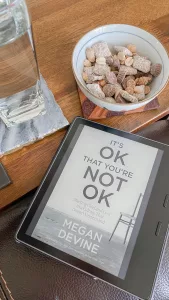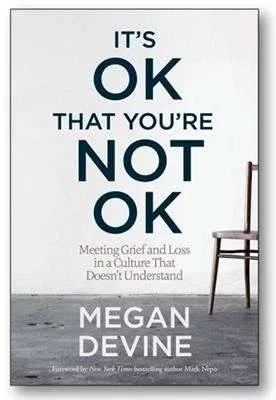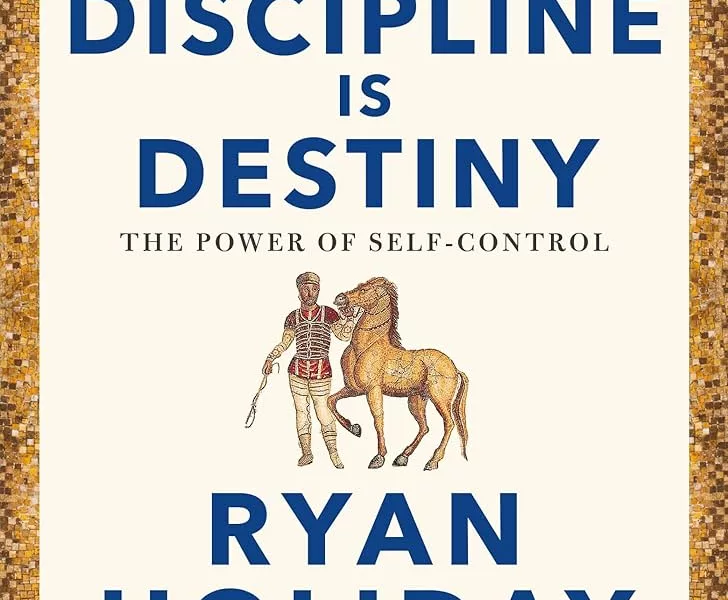It’s Ok That You’re Not Ok by Megan Devine: is an incredible book on grief and processing loss. This is a great read for anyone, whether grieving or not.
Pairs With: a DQ Buster Bar and your favorite tv show.
Overview
It’s Ok That You’re Not Ok by Megan Devine looks at grief and loss through a whole new lens by encouraging readers to abandon the concept of trying to fix grief. Devine states, “This book provides a path to rethink our relationship with grief. It encourages readers to see their grief as a natural response to death and loss, rather than an aberrant condition needing transformation.”
Written by a therapist, Megan Devine shares the grief she felt when she lost her husband. Through that awful experience, she learned how poorly we handle grief in our society and how incredibly unhelpful some of our most well-meaning comments can be.
Devine calls it all out for how it is, “No one can win: grieving people feel misunderstood, and friends and family feel helpless and stupid in the face of grief. We know we need help, but we don’t really know what to ask for. Trying to help, we actually make it worse for people going through the worst time in their lives. Our best intentions come out garbled.”
On top of people around us having no idea what to say, we also put pressure on ourselves to be ok. We worry we’re going crazy or we think unhelpful thoughts like, “I should be over this by now!” Devine reminds readers that you don’t need to be over anything and that when you lose someone you love it just sucks. There’s no fixing it. It’s ok to call it for what it is. She states, “There is not a reason for everything. Not every loss can be transformed into something useful. Things happen that do not have a silver lining.” And, “Grief is not a problem to be solved; it’s an experience to be carried.”
Grief in the Body
When my grandmother passed and my dad was diagnosed with cancer the very next day, my body shut down. It’s incredible how much the heart can physically hurt and feel like it’s breaking. My weight dropped significantly and I thought my heart was shutting down several times a day.
Devine explains how grief affects all aspects of one’s life and especially the body. Grief can impact, “appetite, digestion, blood pressure, heart rate, respiration, muscle fatigue, and sleep—basically everything. If it’s in the body, grief affects it.” She continues, “Heart palpitations, headaches, stomach pains, feeling faint or dizzy—while I am in no way a medical doctor, I can tell you these things appear to be quite common in grief, especially in the early days.”
Go easy on yourself or on anyone you’re caring for – these responses are natural and are the body’s way of processing what has happened.
How to Help
If you want to help someone who has experienced a loss, Devine provides great advice on what NOT to do and what TO do. First off she states, “Show up. Listen. Don’t fix.”

Often people will disappear because they’re afraid of making things worse which just ends up actually making things worse. Devine also encourages, “Don’t be a cheerleader. When things are dark, it’s OK to be dark. Not every corner needs the bright light of encouragement. Do: Mirror their reality back to them. When they say, “This entirely sucks,” say, “Yes, it does.” It’s amazing how much that helps.”
Another tip I found interesting (that I would’ve NEVER thought of) was, “Please try not to do anything that is irreversible—like doing laundry or cleaning up the house—unless you check with your friend first. That empty soda bottle beside the couch may look like trash, but may have been left there by their husband just the other day. The dirty laundry may be the last thing that smells like her. Do you see where I’m going here? Tiny little normal things become precious. Ask first.”
It’s hard to be the one grieving and it’s hard to be the one trying to help. Just being there is sometimes all you can do.
Conclusion
If you are grieving or if you know someone who is grieving and you want to help them, read this book. It’s a quick read and will provide you with many helpful pieces of advice to make the grieving process easier on yourself and on others.
While I was grieving the loss of my grandmother I found this book incredibly comforting. It showed me it’s ok to let myself feel whatever comes up and that I didn’t need to change or do anything to make it go away. I could just let it suck. Acceptance always allows space for things to be processed easier.
This book also helped me be more supportive of my mom who had just lost her mom and be a better listener. And it helped me be more supportive of my dad with his cancer. Sometimes shit just sucks and it’s ok to let it suck. There’s a lot of comfort in that and recognizing it provides space for healing.
Anyway definitely check out It’s Ok That You’re Not Ok. You won’t regret it!
Have you read this one or any others like it? Let me know in the comments!



